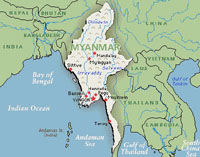Major Myanmar offensive uproots 11,000 civilians - 26 April, 2006
Myanmar troops, engaged in their biggest military offensive in almost a decade, have uprooted more than 11,000 ethnic minority civilians in a campaign punctuated by torture, killings and the burning of villages, according to reports from inside the country and Thailand.

Scores of villages have been abandoned and their inhabitants forced to flee into the jungles as government troops in eastern Myanmar attempt to suppress a decades-old insurgency among the Karen people, say reports from the Free Burma Rangers, a group of Westerners and ethnic minority volunteers who provide aid to displaced people in the country, formerly known as Burma.
Some 11,000 people have fled their homes due to the onslaught, which began last November and has recently intensified, the Free Burma Rangers said. About 1,500 refugees have fled across the border to Thailand, and aid officials fear others will follow in coming months to swell the more than 140,000 already in Thai refugee camps.
Jack Dunford, executive director of the key frontier aid agency Thailand Burma Border Consortium, confirmed the inflow, saying the refugees from Myanmar's Karen State have arrived with "stories of increased (junta) troop activity, widespread destruction of villages and crops and human rights abuses."
The military-run government has denied any human rights violations against ethnic minority groups, including the Karen, which it blames for a spate of recent bombings in the country.
"There is no offensive against the Karen National Union but security measures have been taken and cleaning-up operations are being conducted in some areas where (KNU) terrorists are believed to be hiding," Information Minister Brig. Gen. Kyaw Hsan told reporters in Yangon earlier this month, referring to the main Karen rebel group.
But analysts say the scale of the attacks is the largest since a major offensive against the Karen in 1997 and the KNU fears it may continue through this year's rainy season which begins around May. In the past, military operations were restricted to the dry season when movement through the rugged, malarial border region is easier.
"They don't want the KNU near their new capital," said KNU General-Secretary Mahnshar Laphan, echoing some analysts who say the military is trying to secure the hinterland east of Pyinmana, which was recently established as the new capital, reports the AP.
I.L.
Subscribe to Pravda.Ru Telegram channel, Facebook, RSS!





